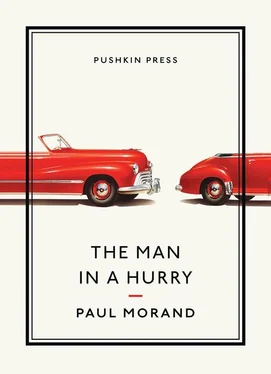“I wonder, restless gardener, how you would manage if you had to wait nine months for a child? I mean, of course, wait for a woman who would be expecting… Indeed, perhaps you wouldn’t wait?”
Pierre went back to put on his leather coat, which he had hung on a nail so that he could do the gardening, wiped his muddy hands on the back of his dungarees and looked at his wife. Her face was a pale, parchment-like colour.
“Firstly, there can be no birth without union, no union without love and no love without excitement. A child, therefore, is something sudden, something that doesn’t wait. It’s a surprise that is the result of a collision. It’s the fruit of a sleepless night. It doesn’t settle at its mother’s breast as though it were at a picnic, it’s hurled out when you’re flat on your back like a seed about to burst. It starts by waking everybody up in the middle of the night, by causing the doctor and midwife to come running. It’s new wine which can’t bear being put in a bottle.”
“Seriously, what would you do?”
“You’ve caught me unawares. I’ve never thought about the question much. I think my reaction would be like anyone else’s.”
“I’m not sure about that.”
“Think of this tiny prospective creature, compressed in this narrow box; it has just one idea, which is to get out, to be born and to spin out its days in the lovely sunshine. Tiny things yearn for the gigantic; the bud craves the leaf; assets require interest: everything that lives aspires to growing taller, becoming larger and multiplying.”
“You see yourself as a grandfather already!” said Hedwige, bursting out laughing.
Pierre laughs too, happy at his wife’s gaiety, but he suddenly becomes thoughtful.
“So why are you telling me all this… today?”
“Only because I think it’s useful to think about things before doing them… so as not to regret them afterwards.”
“Regret them? Me, regret having a child? You’re joking.”
“I’m very serious.”
“Regret having something that would have its source in you! I think I would overflow with joy, I would celebrate it everywhere, it would be more important than anything! A child of yours, goodness me: what an acceleration of our existence!”
“I’m pregnant,” Hedwige replied quietly.
No sound, no lights shining near them. They were alone in this suspended garden, high above the ground, totally alone, facing one another and both of them suddenly feeling very lonely, doing their best to transform this new notion into a series of conventional settings (the belly, the outfit, the nursing home, the pram, etc.).
“Well,” Pierre said simply in a very low voice.
“Are you pleased?”
“I don’t know whether it’s pleasure, it’s… it feels strange.”
“Do you understand why I felt so weary yesterday? When I arrived at Saint-Germain I actually fainted.”
“Sorry!”
Pierre pulled himself together; he brought out a large red handkerchief and took his wife in his arms.
“Thank you,” he said, with tears in his eyes.
“Now, I’m going to ask you just one thing, Pierre…”
“What is it?”
“I beg you to be patient.”
“But of course, I’m bound to be! I’ll be stoical.”
“You swear?”
“I swear.”
“No stamping about, no shouting if I’m late, or inundating police stations with phone calls.”
“All right.”
“No behaving like a compass that’s lost its bearings.”
“Very well.”
“No losing me in the street and walking miles in front of me, hunched up like a racing cyclist.”
“OK.”
“No lighting the fire just to make toast.”
“Agreed.”
“No getting angry when the starter doesn’t work.”
“It goes without saying.”
“No smashing up things when they don’t give way.”
“Is that all?”
“Yes.”
“Anyone would think it was a business agreement.”
Hedwige burst out laughing.
“No, a peace treaty and a pact… for months, dear Pierre, I’m going to be lethargic, a slowcoach, frequently disheartened, clumsy and shapeless. You’ll have to give me credit…”
“Unlimited credit!”
“You’re going to try to live properly, by which I mean respect the present moment. In that way, we’ll manage to…”
“It’s not me who’s speaking in the future, this time, it’s you. You’ll see, Hedwige, I am curable, I’m going to start all over again, I’m going to slow down, I’ll dawdle; you’ll be amazed. Come and sit beside me.”
“Suppose we go down first of all? I’m feeling a bit cold.”
They sat side by side on the sofa. Wanting to be useful, Pierre threw some coal into the fireplace, lay flat on his tummy to use the bellows, and was obliged to open the windows wide to get rid of the smoke. They felt even colder, but gradually everything improved. Hedwige snuggled up. Pierre jumped up and down, buzzed about and made a lot of noise.
“What’s happened to us is wonderful! I was so nervous just now, so far from realizing what awaited me, Hedwige, that I haven’t thanked you properly. My dearest one! What variety there is in our marriage! No one day is like another. It’s like a mad canter through life. I’m totally overwhelmed with happiness!”
“Don’t stride about the flat like that, Pierre, or I’m going to feel ill.”
“Already? It’s even sweeter cherishing plans than it is cherishing a woman. Let’s see: if it’s a girl, we’ll call her Laurentine… or Micheline…”
“Still this need to act quickly!”
“… or Gervaise.”
“And if it’s a boy?”
“I’ll call him Rustique,” said Pierre immediately. “I like Rustique.”
“How ghastly!”
The lunch hour had long passed and they were still musing about the future, mortgaging it. Pierre was talking nonsense and daydreaming, while Hedwige was, even now, having some difficulty in trying to follow him.
At two o’clock, they felt hungry. Pierre rang Prunier’s, interspersing his order with his plans.
“Hello! Passy 17–87?… Where will you give birth?… Could you send me a lobster?… I’ll be the one who rocks it in the cradle.”
“At least wait until you have rung off. Prunier’s are likely to send you a pair of baby-scales.”
“Will you let me cradle it?”
“Oh no! You would demolish it!”
“We shall have a nickel-plated pram with mudguards. I shall push it myself.”
“You’d race with it.”
“Wait for me. I’m going down to get some champagne from the cellar. I’ll be back up in a jiffy.”
Pierre opened the door abruptly without bothering to close it, leapt down two flights of stairs and came back up again.
“Hedwige, I love you.”
Once again, he was out of the room. Once again, the stairs could be heard creaking beneath his weight. He retraced his steps and, taking Hedwige by the wrists, said:
“All I have to give you is my time: it’s entirely yours.”
Returning from the cellar, he seized Hedwige, he made her dance, he lifted her into the air, he ripped her blouse and messed up her hair. He hummed “Blanche-Neige” and sang “Les Dragons de Villars” at the top of his voice, while at the same time juggling with the plates and laying the tablecloth, making jerky and comic movements, as they do in the music halls.
“Hedwige,” he said solemnly, brandishing a large loaf of bread, “you have given me what I want most in the world!”
“A child?”
“Better than that, some prospects.”
ONE MORNING, on waking, Pierre received a letter from Doctor Regencrantz:
Monsieur Velocipedist,
The last time I saw you, I informed of you of my imminent departure for Palestine. I was only waiting for a visa for Honduras. Honduras refused me one. Your regulations having forbidden me to practise medicine in France, in order to earn my living, I joined a woollen broker’s firm in Roubaix. Since then, I have been hopping from one job to another, as the hamadryad jumps from branch to branch, but like it I am sure of reaching the end of the forest.
Читать дальше












